Small stones
To knock on doors of our ancestors
We died in militant silence
We are true battalions
And we … have been one with this land — Napo Masheane, We Have Been Here Before
To the uninformed eye, they look like ordinary little rocks. Jutting out across an area no more than 70m in length and 10m in width, their seemingly haphazard positioning makes gauging their number difficult.
But these are not ordinary little rocks. They are nameless gravestones, marking the lives and deaths of some of the Northern Cape’s Nama inhabitants.
Located outside Steinkopf, a coloured area — or “reserve”, as it is referred to here — the graveyard, local resident Jakobus Cloete estimates, has been there for more than 200 years.
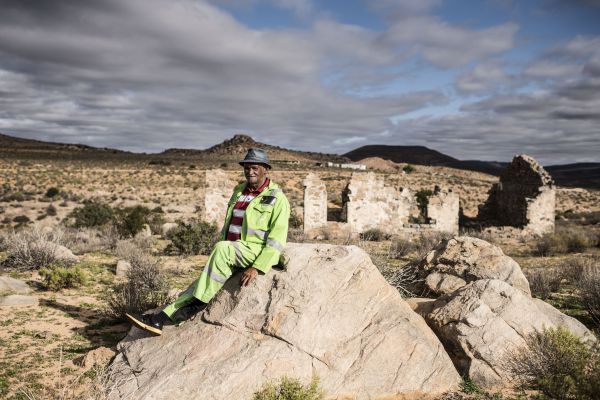
[Jakobus Cloete: ‘My great-great-grandchild is the eleventh generation on this land’. (Paul Botes/M&G)]
Along with other Northern Cape residents who made their way to the town hall in Concordia, Jakobus Cloete was one of many farmers who attended the Northern Cape’s first public hearing on land expropriation without compensation.
The hearing was held in Concordia, near Springbok in the Namaqualand area, and forms part of national hearings on a review of section 25 of the Constitution — which addresses property ownership — to make it possible for the state to expropriate land “in the public interest without compensation”.
Earlier this year, the National Assembly and the National Council of Provinces mandated the joint constitutional review committee to review this section of the Constitution. More than 700 000 written representations on land expropriation were submitted by the public.
Years of exposure to the harsh Northern Cape sun has weathered Jakobus’s face, making him look older than his 65 years. But what his face lacks in youth, his eyes more than make up for. Deep-set, dark and always smiling, they glint warmly as he speaks at breakneck speed about the land he has lived on all his life.
As we bob along on the rough gravel road from his bright-green home to a communal farm a few kilometres away, he laughs as he complains about the state of roads in the area. “Ons het met die regering gepraat en gepraat, maar hulle luister nie [We’ve spoken to the authorities again and again, but they don’t listen],” he says.
To keep the communal farm in his family, he is prepared to do even more speaking to the government — and hopes that this time it will listen.
With an equal measure of pride and fear, Jakobus says: “My agter-agter-kleinkind is die elfde geslag wat nou op hierdie land is [My great-great-grandchild is the eleventh generation on this land].”
On expropriation without compensation, he says simply: “Dis nie reg nie. Wat joune is, is joune [It’s not right. What’s yours is yours].”
Pointing to the pen and notepad in my hand, he adds: “As ek die boek en die pen van jou af neem — sonder om vir jou iets daarvoor te gee nie — dis mos nie reg nie [If I take that book and that pen away from you — without giving you anything in return — that’s just not right].”
The close on four years of ongoing drought the region is experiencing might be tough (“ons kry swaar [we are suffering]”), but it has done nothing to dampen his passion. “Dis ons land hierdie. Ons is gelukkig hier [This is our land. We are happy here].”
At the same hall where, a day before, he had made an impassioned plea to the committee not to allow his land to be taken away, Arthur Cloete arrives to collect the government-sponsored drought relief vouchers he has been waiting months for.
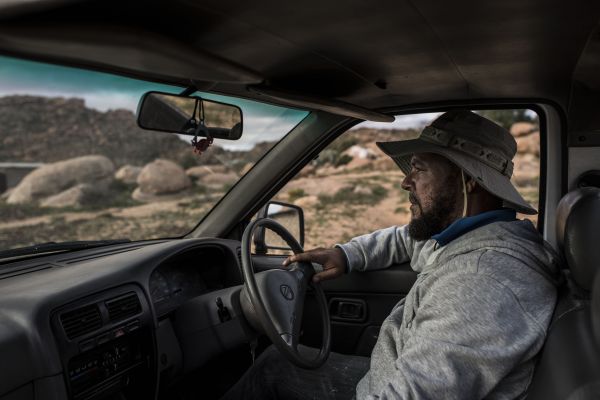
[Arthur Cloete: ‘We are proud Nama people, even though we are mixed in our lineage’. (Paul Botes/M&G)]
“Every time they would tell us to come here, but nothing,” he laughs wryly, as he and a smattering of other early-bird farmers fight off the bitter early-morning cold in the hopes of being the first to catch the proverbial and long-waited-for worm.
Arthur and his fellow farmers are in luck. That day, they leave the hall with their vouchers in hand.
But the relief is soured by the prospect of perhaps having to give it all up one day.
A young farmer (“I think I’m 43,” he laughs), Arthur has been farming for “about five years” on the communal land that has been in his family for generations.
The tract of land on which they live has small livestock and “some geese and poultry”, he says.
“[It] has a lot of meaning for us in the family. The fact that we have Nama heritage, before ’94 we could not acknowledge it. It was not something to be proud of. We can now say we are proud Nama people, even though we are mixed in our lineage. That is what the new dispensation brought us.”
But what the new dispensation could be taking is what Arthur is now fighting against. A member of the Concordia Farmers’ Association, which submitted a written representation to the constitutional review committee, opposing changes to the Constitution, he says: “As soon as we give the government explicit power to take land without compensation, you open everybody up to that risk of losing their land, their ownership.”
He also sees the issue as potentially divisive. “People will use this issue in politics to divide people. And it shouldn’t be that [way].”
As part of her oral submission during the public hearing, Ilanushca van Neel, an activist from Concordia, also takes to challenging the government.
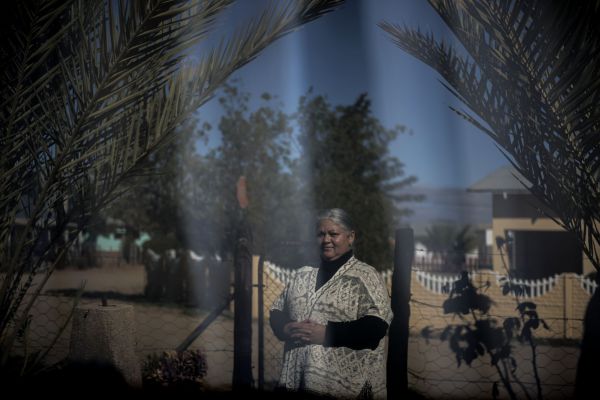
[Ilanushca van Neel: ‘Land is the single most important thing for the people of this region’. (Paul Botes/M&G)]
Van Neel asks: “Why is it that there are millions of rands to run this process [of holding public hearings], but no money to send the department of rural development here to start the process of getting our land into our names?”
Speaking to the Mail & Guardian over “’n koppie tee” in her Concordia home, she concurs with Arthur Cloete.
“Politicians have a tendency of keeping our people locked in a history that did not benefit them. Keeping people in that loop … they can play a card that will keep the divide forever.”
At the province’s first public hearing into land expropriation, the divide is already felt.
AfriForum’s Ernst Roets calls the process an attempt by the government “to take more land and not give people land”.
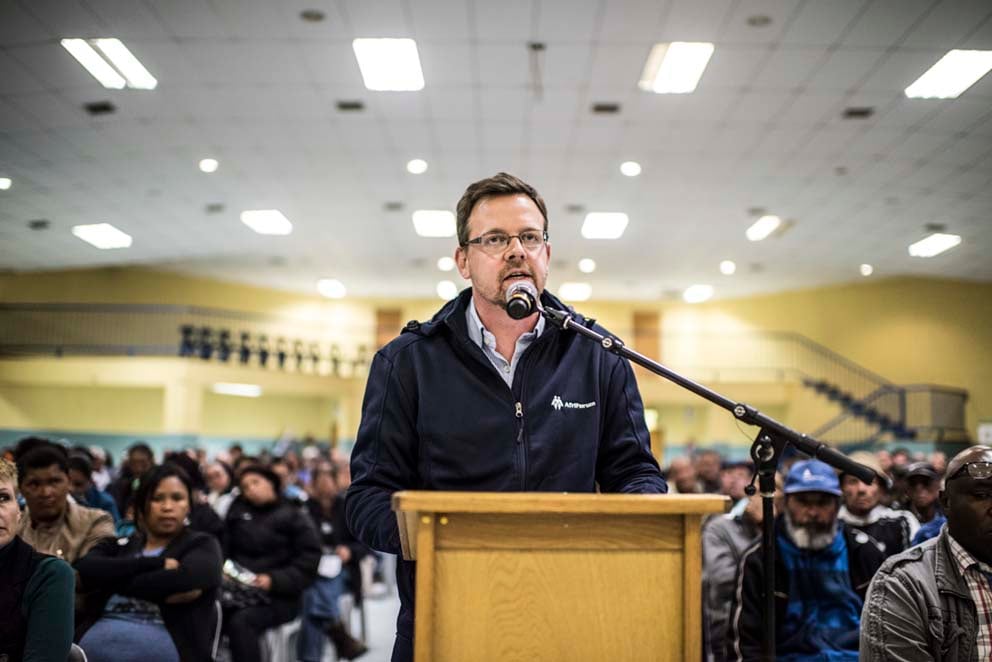
[Ernst Roets. (Paul Botes/M&G)]
Van Neel asks: “Why is it that there are millions of rands to run this process [of holding public hearings], but no money to send the department of rural development here to start the process of getting our land into our names?”
Speaking to the Mail & Guardian over “’n koppie tee” in her Concordia home, she concurs with Arthur Cloete.
“Politicians have a tendency of keeping our people locked in a history that did not benefit them. Keeping people in that loop … they can play a card that will keep the divide forever.”
At the province’s first public hearing into land expropriation, the divide is already felt.
AfriForum’s Ernst Roets calls the process an attempt by the government “to take more land and not give people land”.
The organisation has delivered a petition to the government, containing about 300 000 signatures of people opposed to land expropriation without compensation.
Roets adds that the government is “hero-worshipping the policies of some of the world’s worst economies”. He’s referring to countries such as Zimbabwe and Venezuela — “the disasters of the last century”.
Hinting at possible violence if such expropriation were to go ahead, Roets says: “The question of whether there will be violence is not dependent on the state [but rather] on the [willingness of] people whose properties are being expropriated to defend themselves.”
Taking a different tack, Northern Cape resident Pieter Meyer calls for expropriation by telling the committee: “We want the diamond land back” — otherwise “we will take the land back; we will fight”.
During her submission, Lucia Roman adds: “The land was taken from us. We want our land. Change this law. Change it.”
On the day of the hearings, among tranquil hills — far from the din of emotive speeches, applause and boos — Randall April is doing what he has been doing for the past four years: herding goats on communal land, about 5km outside Concordia.
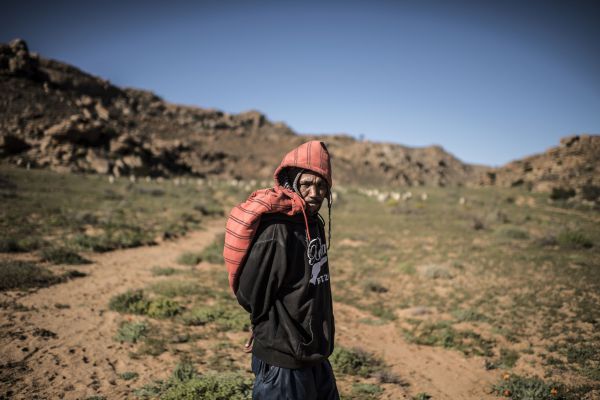
[Randall April: ‘I don’t know what will happen if they do this. We are already suffering’. (Paul Botes/M&G)]
Although he says he has three of his own, most of the goats in his care belong to his “laanie [boss]”.
April has heard about the possibility of this land no longer being in their hands and is not pleased at the prospect.
“Ek weet nie wat van ons sal gebeur as hulle so maak nie. Ons kry al reeds swaar. Ons sukkel al klaar [I don’t know what will happen if they do this. We are already suffering and struggling],” he says, before running off to try to keep the now-errant goats together.
Van Neel, a local radio show host who promotes entrepreneurship in tourism, says of the importance of land to the region’s Nama descendants: “Land is the single most important thing for the people of this region, and has been for generations. But once that was taken away from them in big chunks, people … couldn’t practise their traditional ways any more.”
We do not ask for wealth because he that has health and children will also have wealth. We do not pray to have money but to have more kinsmen. — Chinua Achebe, Things Fall Apart
Although it’s only 15km from Concordia, Jacob and Magrieta Cloete’s farm feels like a world away; it’s like somewhere in another time. The couple are among the few Nama descendants who adhere with dogged determination to their traditional ways.
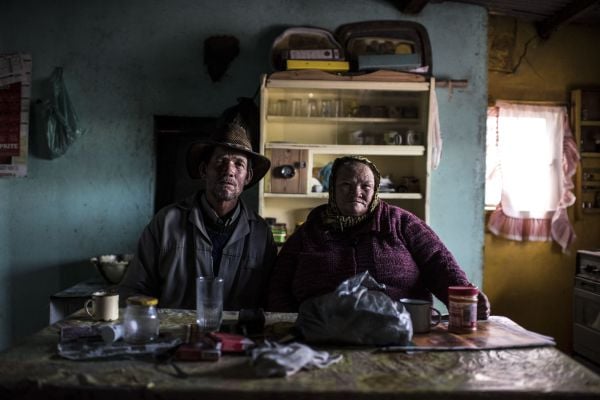
[Jacob and Magrieta Cloete, who adhere to the pastoral ways of their Nama forebears, are dead set against allowing the government to expropriate land without compensation. (Paul Botes/M&G)]
At 64, Jacob still ploughs his tiny field with a donkey (“Dis harde werk, ja [Yes, it’s hard work],” he laughs). In the rondehuisie — traditional Nama hut — Magrieta prepares their food over fires. There is no electricity. Flour is ground by hand.
Magrieta is sitting on her favourite bench where, on nights when she cannot sleep, she comes to stare at stars, listen to the odd jackal’s cry or, she laughs, pointing to a tree, “Praat met ’n uil wat daar kom sit [talk to an owl that comes to sit there]”.
For the couple, adherence to the ways in which they were raised is not up for discussion.
“Ons het ons eie paar veetjies, hoendertjies, ’n kat, honde, donkies, drie beeste. Maar dit is vir ons uniek om so aan te gaan. As ek my oë hier kan sluit, dan is dit tip-top vir my. Dit is wat ons voorgeslagte ook begeer het. Om hul oë hier te sluit. Hier wou hulle in vrede gaan [We have our own livestock, chickens, a cat, dogs, donkeys, three cows. But for us, it’s is unique to live like this. If I can die here, I will be happy. This is what our ancestors desired: to die here, in peace].”
“Dit was hulle lewe. Dit was al wat hulle geken het. En hulle het geglo die landskap waar hulle op is, is hulle heiligdom. Hulle het hulself voorberei. Dit gaan van geslag tot geslag. Hier op hierdie land wil hulle hulle kinders voorentoe laat gaan,” Magrieta says.
She is describing how this was the life her forebears knew, that “their land was their kingdom” to pass it down to future generations.
Being the third generation to occupy this piece of land, she says it is very important that their sons and grandchildren take over once the pair have “shut their eyes”.
On land expropriation without compensation, Jacob, a kind-eyed man of few words, says: “Dit is onregverdig [It is not fair].”
Magrieta is more vocal. “Jy vat my land, jy vat ’n stuk van my weg. Jy beroof my van dit wat ek lief het en vir dit wat ek lewe, behalwe my God [You take my land, you take a piece of me. You rob me of what I love and what I live for, except for my God].”
She adds: “Ons twee se lewe is amper verby. Maar ons hou aan God se voete vas. Hy het ons voorgeslagte hier gesit [Our lives are almost over. But we cling to God’s feet. He placed our ancestors here].”
For Arthur Cloete, land is inextricably linked to his identity as a Nama descendant.
“I’ve come to the realisation that I need to own my heritage. This is where I learned to speak, where I learnt to walk. And I am passionate about it. Everything. I love the rocks, the plants, the flowers.
“We’ve been going through a drought for three years — the worst drought in over 100 years — but even so, I love Namaqualand. It’s in me. It’s part of me and I wouldn’t want to live anywhere else.
“Everything was stolen from the Nama people — their land, their identity. We need to prevent that from happening ever again.”
South Africa
Your aspirations asphyxiate me
I die each day just to live free
Bonded to the lie that I could own any land
Or that you could ever build a fence that could hold all of me
The dead have us by the collar
The dead squeeze themselves into our dreams
You believe that you belong to yourself
The dead are using our eyes to see
— Lebo Mashile, The Dead Living
Back at the graveyard, Jakobus Cloete sighs: “Ja, so is die lewe. Maar dis ons s’n, hierdie. Dis ons land. Waar anders? [Yes, such is life. But this is ours, this is our land. Where else would we go]?”
With nowhere else they can go — or want to go — he and the farmers in this region will keep fighting for their land. Fighting to ensure that those who come from the people buried beneath those nameless, seemingly ordinary little rocks are always remembered. Never nameless. Never landless.
Carl Collison is the Other Foundation’s Rainbow Fellow at the Mail & Guardian